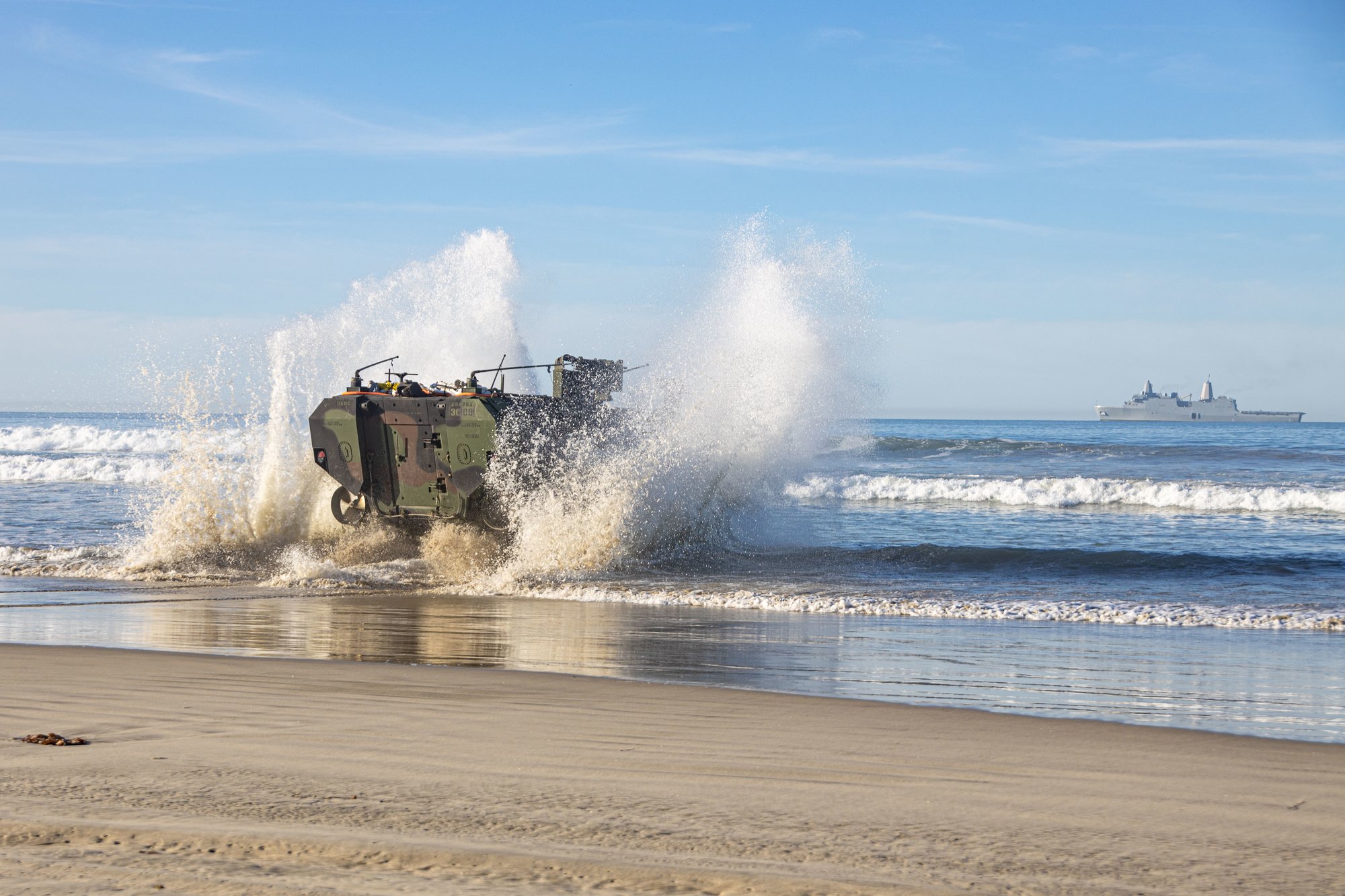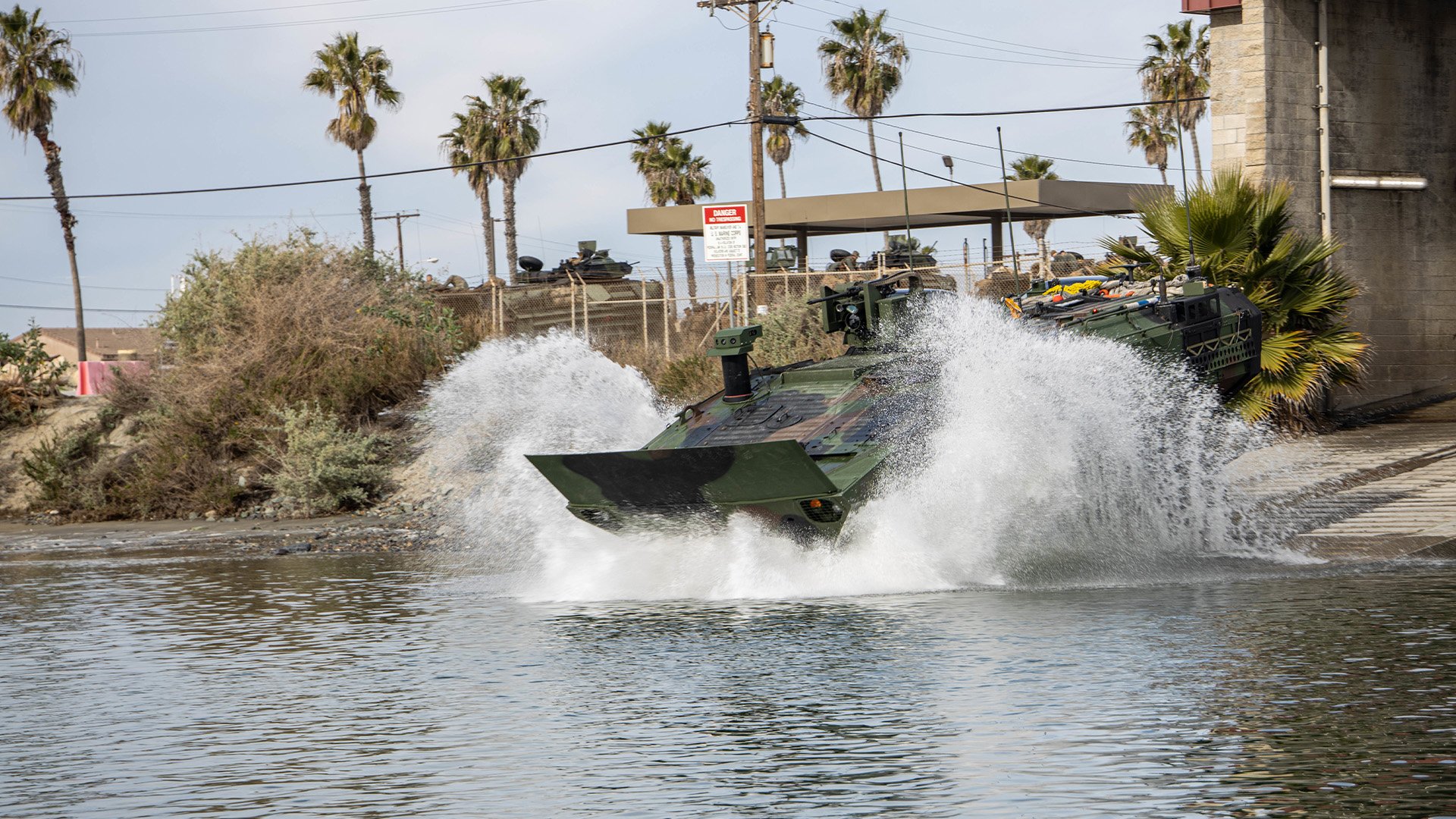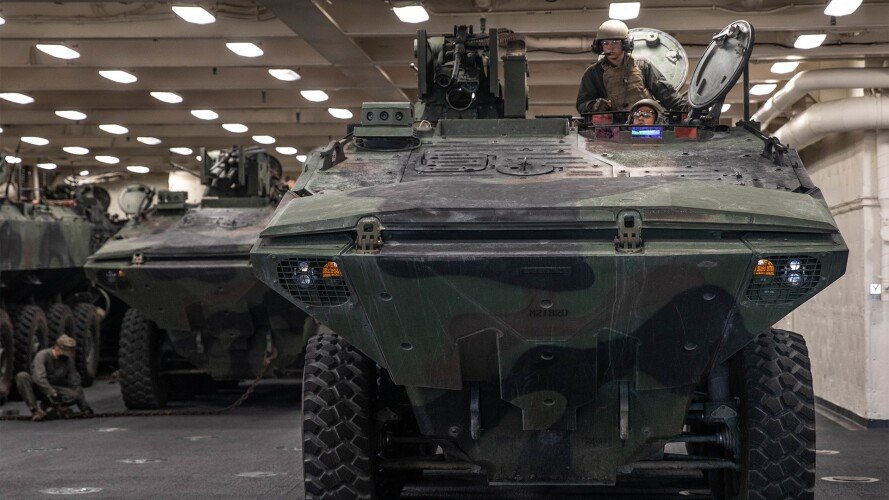
US Marines and sailors assigned to 3d Assault Amphibian Battalion, 1st Marine Division, conduct waterborne training with an Amphibious Combat Vehicle moving from shore to the amphibious transport dock ship Anchorage at Marine Corps Base Camp Pendleton, California, Feb. 12, 2022. US Marine Corps photo by Lance Cpl. Willow Marshall.
Eight weeks after a pair of Marine Amphibious Combat Vehicles foundered in high surf off California’s Camp Pendleton, the Corps greenlighted a return of the armored behemoths to the sea, with some restrictions.
Announced Thursday, Sept. 22, the new guidance bars the use of the personnel carriers when seas have a significant breaker height of 4 feet.
Built by BAE Systems, the vehicles are supposed to operate in conditions up to Sea State 3 — slightly rough waves cresting up to 4 feet high in open water — while bringing 13 troops and three crew members to shore, even through a 9-foot plunging surf.
“We remain steadfast to the safety of our Marines who conduct amphibious operations, and expect strict adherence to established standards that allows our ACVs to return to waterborne operations,” said US Marine Corps Lt. Gen. David J. Furness, deputy commandant for Plans, Policies and Operations, in a prepared statement emailed to Coffee or Die Magazine. “Our training and discipline allow us to continue sharpening our warfighting abilities to remain the nation’s premier expeditionary force in readiness.”

US Marines and sailors with Charlie Company, 3d Assault Amphibian Battalion, 1st Marine Division, launch an amphibious combat vehicle into the water during a training event at Marine Corps Base Camp Pendleton, California, Jan. 31, 2022. US Marine Corps photo by Cpl. Alexandra Munoz.
That sharp tip of the spear appeared a little blunted on July 20, when the Corps suspended all training in the 10-feet-tall amphibious carriers, except in protected waters or on land.
That confined most training to Area 21 of Camp Pendleton, the Del Mar Boat Basin.
On Tuesday, Marine officials called the new interim guidelines “conservative” and believe they’ll buy time for the sea service to study better how surf conditions affect the new system, which replaces the aging and increasingly dilapidated Assault Amphibious Vehicles that were designed during the Vietnam War.
The next day, they added that the new directive stemmed from Marine Corps Operational Test and Activity and Fleet Marine Force data compiled at Camp Pendleton since early 2020.
"The Marine Corps continually seeks to improve the overall capability of the ACV and reduce any risks and challenges identified through the operation of the vehicle by the Fleet Marine Force," said Marine Corps spokesperson Capt. Ryan Bruce, in an email to Coffee or Die.
"Amphibious operations are inherently complex, and we are always learning and refining best practices and procedures," he added. "The established surf conditions will allow our Marines to get back in the water and continue to train and test the platform, increasing their skills, while also ensuring we better understand the overall capabilities of the ACV as a service."

A Marine Amphibious Combat Vehicle with 3d Assault Amphibian Battalion, 1st Marine Division, is loaded aboard the amphibious dock landing ship Anchorage at Naval Base San Diego, Oct. 21, 2021. US Marine Corps photo by Cpl. Cameron Hermanet.
The Pentagon told Coffee or Die the new guidance affects the crews of 90 Amphibious Combat Vehicles fielded by the 3rd Assault Amphibian Battalion, plus the instructors and students training on the 36 carriers at Assault Amphibian School.
Both commands are headquartered in California.
This is a breaking story and Coffee or Die Magazine will continue adding to it.
Read Next: Sailor Accused in Warship Fire Falsely Claimed 2 SEAL Hell Weeks, Investigator Says

Carl Prine is a former senior editor at Coffee or Die Magazine. He has worked at Navy Times, The San Diego Union-Tribune, and Pittsburgh Tribune-Review. He served in the Marine Corps and the Pennsylvania Army National Guard. His awards include the Joseph Galloway Award for Distinguished Reporting on the military, a first prize from Investigative Reporters & Editors, and the Combat Infantryman Badge.
BRCC and Bad Moon Print Press team up for an exclusive, limited-edition T-shirt design!
BRCC partners with Team Room Design for an exclusive T-shirt release!
Thirty Seconds Out has partnered with BRCC for an exclusive shirt design invoking the God of Winter.
Lucas O'Hara of Grizzly Forge has teamed up with BRCC for a badass, exclusive Shirt Club T-shirt design featuring his most popular knife and tiomahawk.
Coffee or Die sits down with one of the graphic designers behind Black Rifle Coffee's signature look and vibe.
Biden will award the Medal of Honor to a Vietnam War Army helicopter pilot who risked his life to save a reconnaissance team from almost certain death.
Ever wonder how much Jack Mandaville would f*ck sh*t up if he went back in time? The American Revolution didn't even see him coming.
A nearly 200-year-old West Point time capsule that at first appeared to yield little more than dust contains hidden treasure, the US Military Academy said.












